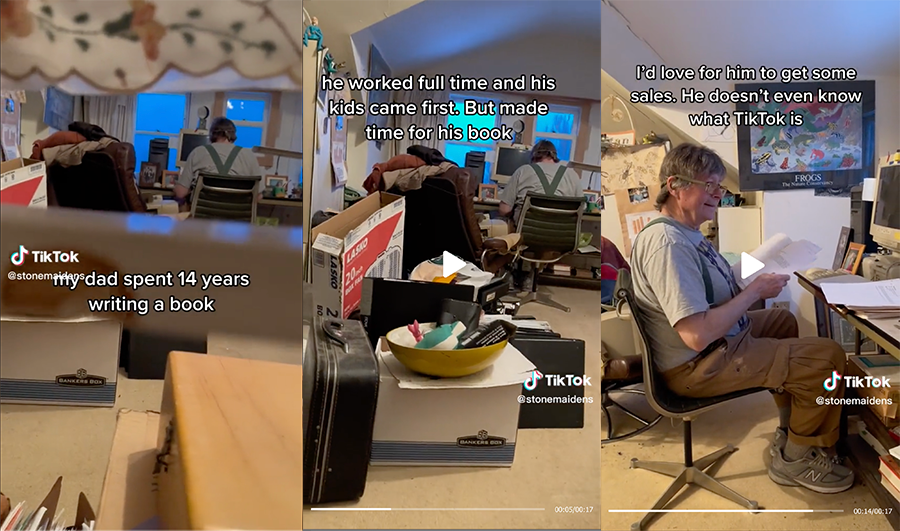Yesterday I taught a class titled “Marketing Books That Aren’t New,” which was hosted by Jane Friedman. Throughout the presentation, I shared many ideas and suggestions, and I have been considering what ties them all together. I think it is this: that today, authors have agency in a way they rarely did in the past.
Meaning: you have options to share your voice, share your writing, and connect with others.
Years ago, writers and creators had so many fewer options to share their work. They relied on the promotional value of a “book launch” because this was critical to get media and gatekeepers interested in talking about your writing. That could be a book signing, a book review, an article, etc. There was this brief window of the book launch (a few weeks to a few months) that you could vie for attention for your book, always relying on others to spread the word.
But now, you have more choices. More access. More channels. A greater ability to share your voice, connect with others, and over a longer timeline.
For the past couple of months, I have been listening to the 1974 book, “The Power Broker,” which outlines the life and impact that urban planner Robert Moses had on New York. The scope of his projects (parks, highways, bridges, buildings) is astounding. But the book paints a detailed picture of how he amassed and leveraged power to get what he wanted. It’s 1,300 pages, and takes 66 hours to listen to on audiobook, which is how I’m doing it.
I’m at a moment in the book where author Robert A. Caro is telling the story of how, after 30 years or protests to some of Robert Moses’ projects, one protest finally received attention. The author describes how so many protests in the past were never noticed by the broader population, so the protests to those projects always failed. Why? This line from the book:
“There was not a single reporter or photographer present.”
That line jumped out at me. These people who were protesting a project had a message. Often it was residents who were being displaced, and had nowhere else to go. They had organized. In some cases, they commissioned studies. They sometimes got prominent people involved. They raised funds. To no avail. Because they couldn’t get the attention of the media, who would have amplified their message to reach thousands, or even millions of others.
Their voices weren’t heard. They had no access, and no ability to share beyond small local events.
But today, we each have the ability to take photos, record video, write, publish, and share more broadly. Let me provide an example. This week I saw many people sharing the story of a daughter who posted a 17 second video to TikTok about her father’s novel, which read:
“My dad spent 14 years writing a book. He worked full time and his kids came first. But made time for his book. He’s so happy even though sales aren’t great. I’d love for him to get some sales. He doesn’t even know what TikTok is.”
The John Lennon song “Beautiful Boy” plays in the background. Was his daughter an influencer? I don’t think so, the video she shared was the first video on a brand new account for her dad on TikTok. Was the video super well produced? Well, here are some screenshots, it starts with a dusty typewriter case and empty cardboard box in the foreground, her father on the other side of the room facing away from the camera. :
The 17 second video went viral. At the time of writing this, his book is ranked #15 overall on Amazon. Not in his category, but for ALL BOOKS. I believe it was higher on the list earlier in the week. The book now has 851 ratings (most of them came in recently, all very positive.)
And if you look at the 40,000 comments on the video, they are gushing and supportive.
Your ability to share your voice and your writing, and to connect with others in a meaningful way is so much greater today than ever possible before. Are there problems with social media? Yep. Do you have to use it? Nope. But the channels at your disposal go beyond social media: to newsletters, online events, blogs, and so much else.
Of course, this too can be overwhelming, having so many options to share your message. But this is where I think back to the people from years ago, who couldn’t get a photographer or reporter to show up, frustrated that they had no means for their message to be heard. You get to choose if, when, and how you want to share. And you always have the option to choose not to share. But if you do, I encourage you to:
- Focus your efforts so that you can do one thing really well, instead of being overwhelmed with 1,000 to-do’s.
- Create a system to help plan and sustain this work of sharing.
- Be consistent in sharing and connecting.
- Whenever possible, don’t do this work alone. Develop colleagues who you can collaborate with, learn from, or just inspire you to keep going.
Thanks!
-Dan

